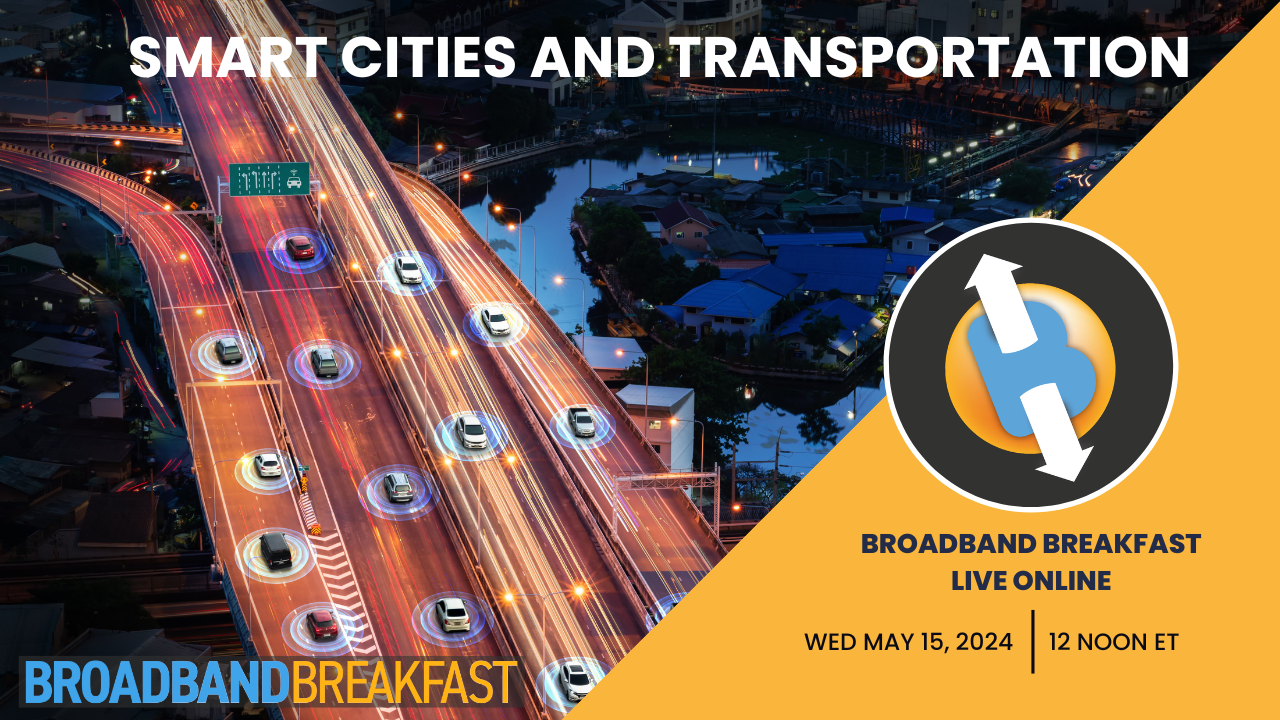More Spectrum Required to Unlock Smart Car Potential, Say Industry Leaders
Panelists said autonomous cars have the potential to reduce fatalities, but need more spectrum from the FCC.
Joel Leighton

WASHINGTON, May 20, 2024- Representatives from wireless technology organizations say more spectrum is needed to fully realize intelligent transportation services.
A Broadband Breakfast Live Online discussion on Wednesday highlighted industry plans to roll out sophisticated automation systems for vehicles, as well as the role of federal agencies in ensuring its success.
 Broadband BreakfastIndia Herdman
Broadband BreakfastIndia Herdman
John Kuzin, vice president of spectrum policy and regulatory counsel at Qualcomm, highlighted mobile providers' deployment of Cellular Vehicle-To-Everything. Through cellular networks and direct user-to-user communication, CV2X can identify pedestrians, roadside infrastructure and other vehicles and warn drivers of upcoming hazards.
This technology goes beyond just a warning system, panelists said. Communication between vehicle, pedestrian and roadside infrastructure has the potential for comprehensive vehicle automation. Kuzin added public service vehicles like ambulances can use traffic light preemption, turning lights green for them and red for others.
Deployment of this technology has yet to be mass adopted. The Federal Communications Commission has only approved 49 waivers to car makers, road operators and equipment makers to deploy the technology, under the 5.9 GigaHertz (GHz) spectrum band. Qualcomm, along with the 5G Automotive Association, are working with the FCC and the Department of Transportation, among other departments, to encourage a wider strategy for enrolling units in vehicles and roadside infrastructure.
Qualcomm is hopeful the FCC will adopt rules to increase the deployment of the technology this year, according to Kuzin.
David Pickeral, co-founder of Sheeva.AI, outlined another prerequisite for CV2X and similar technology to fully realize its potential: Technology will be required to protect passengers and make split-second decisions about autonomous vehicles, including when multiple vehicles are involved.
“All of that’s going to require a lot of spectrum," he said. "A lot of clear, unfettered, non-interference-based spectrum. I call [spectrum] the real estate that you put everything on,” Pickeral said, emphasizing the essentiality of a high latency, throughput environment.
India Herdman, senior manager for policy affairs at the Consumer Technology Association, also emphasized the importance of low latency, high speed data and pointed to fiber optics as a good direction to ensure this.
“There are opportunities for the broadband networks to really unlock those transportation systems that are safe, equitable and accessible,” Herdman said.
She also discussed the possibility of edge nodes in the future to increase efficiency.
“Edge nodes would be an incredible installation into the autonomous vehicle industry and it would again, allow those decisions to happen even faster,” Herdman said.
Herdman does not believe the United States is investing enough in this potentially powerful technology. China, by comparison, is investing vast state subsidies for clean energy technologies, particularly electric vehicles and other smart infrastructure, she said.
As both Kuzin and Herdman talked about the possibilities within an environment that unlocks this vehicle-to-everything technology, they did not rule out the possibility of the technology extending to flying cars.
Qualcomm, along with other industry leaders, are petitioning the FCC for a portion of the 5030-5091 MegaHertz (MHz) band. Having radios that can communicate in both spectrum frequencies for roads and air is wise, Kuzin said. That might even include a future with flying cars.

Panelists
- Ryan Lafler, President and CTO, Quantum Corridor
- Gary Bolton, President and CEO, Fiber Broadband Association
- Vaibhav Garg, Executive Director, Cybersecurity & Privacy Research and Public Policy Research, Comcast Cable
- Drew Clark (moderator), Editor and Publisher, Broadband Breakfast
 Broadband BreakfastIndia Herdman
Broadband BreakfastIndia Herdman








